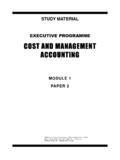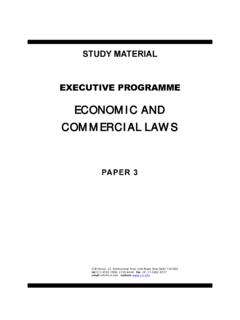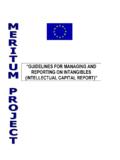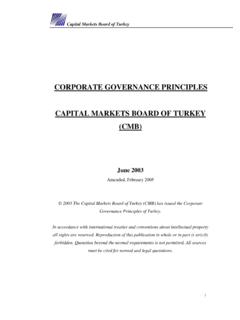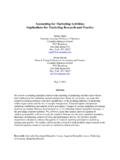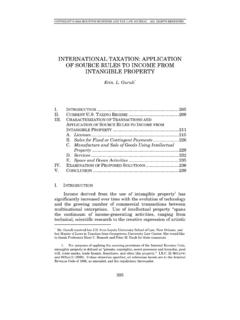Transcription of PROFESSIONAL PROGRAMME DUE DILIGENCE AND …
1 PROFESSIONAL PROGRAMME . DUE DILIGENCE AND corporate compliance management . DETAILED CONTENTS. STUDY I. DUE DILIGENCE AN OVERVIEW. Introduction Nature of Due DILIGENCE in different contexts Need for due DILIGENCE and its significance Objectives of due DILIGENCE Scope of due DILIGENCE Types of due DILIGENCE Factors to be kept in mind while conducting due DILIGENCE Stages/process of due DILIGENCE Transactions requiring due DILIGENCE Documents to be checked in due DILIGENCE process The Concept of data room in due DILIGENCE Due DILIGENCE vs. Audit Conclusion SELF-TEST QUESTIONS. STUDY II. DUE DILIGENCE EQUITY ISSUES. Introduction and Regulatory Framework Due DILIGENCE IPO/FPO. Securities and exchange board of India (Issue of capital and disclosure requirements). Regulations, 2009 (ICDR regulations). A check list on Major IPO Compliances under SEBI(ICDR) Regulations 2009. Role of Company Secretary in an IPO. Due DILIGENCE Preferential issues Due DILIGENCE of Preferential issues by listed companies Due DILIGENCE preferential issues of unlisted companies Due DILIGENCE Employee Stock Option Due DILIGENCE Bonus issue Due DILIGENCE Rights Issue Due DILIGENCE Qualified Institutions Placement SELF-TEST QUESTIONS.
2 STUDY III. DUE DILIGENCE ISSUE OF DEBT INSTRUMENTS. Debt Instruments and its various types Risks on trading in Debt Instruments Regulatory Framework for Debt Securities Checklist . Under SEBI(ICDR) Regulation 2009 (compliances with respect to issue of convertible debt instruments). Under SEBI (Issue and listing of Debt Securities) Regulations, 2008. (Compliances with respect to non-convertible debt instruments). Under listing agreement for debentures issued through public/rights issue Under listing agreement for privately placed debentures Under SEBI (Public Offer and listing of securitized debt instruments) Regulations 2008. SELF-TEST QUESTIONS. STUDY IV. TAKEOVERS AND ACQUISITIONS. corporate restructuring through mergers acquisitions and takeovers an overview Takeovers Kinds of takeovers An overview of international comparison on takeovers Takeover process in India SEBI (SAST) Regulations 1997. Important definitions Exemptions Disclosures Trigger points Public announcement Checklist on Takeovers Checklist for Acquirer Checklist for Target Company Checklist for Merchant Banker Cultural issues on mergers, acquisitions and takeovers Takeover Defences Penal Provisions Annexure A Details/documents/information required from target company Annexure B Checklist for takeover SELF-TEST QUESTIONS.
3 STUDY V. compliance OF LISTING AGREEMENT. Introduction Important compliances under listing agreement Board Meeting Annual General Meeting and Book Closure In-principal approval before further issue of shares Intimations and submissions to the stock exchange Minimum holdings Company secretary as compliance officer Financial results/Publications Statement of deviations and appointment of monitoring agency Shareholding Pattern Uniform procedure for dealing with unclaimed shares corporate Governance Penalty for non- compliance of listing agreement Certification by Practising Company Secretary Listing Agreement Annexure A Time based compliance Annexure B Event Based compliance Annexure C Monthwise compliance Checklist for a listed company SELF-TEST QUESTIONS. STUDY VI. INTERNAL AUDIT OF DEPOSITORY PARTICIPANTS. Depository System an overview Legal Framework for depository participants Role of Depository participants Dematerialisation Rematerialisation Pledge/Hypothication Important compliances to be ensured by Depository Participants Internal Audit of Depository Participants Checklist for Internal Audit of Operation of Depository Participants Concurrent Audit SELF-TEST QUESTIONS.
4 STUDY VII. ISSUE OF DEPOSITORY RECEIPTS. Introduction Types of Depository Receipts Broad Regulatory Framework within and outside India in respect of issue of depository receipts Parties, approvals, documentation and process involved in the issue of GDRs Process involved in the issue of GDRs Checklist in respect of due DILIGENCE of issue of GDRs SELF-TEST QUESTIONS. STUDY VIII. INDIAN DEPOSITORY RECEIPTS. Introduction Broad Regulatory Framework Checklist under Companies (Issue of Indian Depository Receipts). Rules, 2004. Checklist under SEBI(ICDR) Regulations 2009. Listing agreement for IDRs Penal provisions relating to issue of IDRs Annexure A Listing agreement for IDRs Highlights SELF-TEST QUESTIONS. STUDY IX. SETTING UP OF BUSINESS UNITS AND JOINT VENTURES IN INDIA. Foreign Investment in India Technical/Financial Collaboration Joint Ventures in India Sample checklist on Joint-ventures in India Checklist-Financial collaboration Checklist-Technical collaboration Setting up of Branch liaison and project offices SELF-TEST QUESTIONS.
5 STDUY X. SETTING UP OF BUSINESS UNITS AND JOINT VENTURES ABROAD. Introduction and Statutory Basis Eligibility Restrictions Approvals Direct Investment outside India Automatic Route Direct Investment outside India Approval Route Acquisition of a foreign Company through bidding or tender procedure Investment under SWAP or exchange of shares arrangements Overseas investments by proprietorship concerns/unregistered partnership Overseas Investment by registered trust/society Procedural Checklists Important Clauses in international joint ventures SELF-TEST QUESTIONS. STUDY XI. LEGAL DUE DILIGENCE . Introduction Objectives of legal due DILIGENCE Scope of legal due DILIGENCE Need for legal due DILIGENCE Legal due DILIGENCE process General documents/aspects to be covered Possible Hurdles in carrying out a legal due DILIGENCE and remedial actions Role of Company Secretary in Legal Due DILIGENCE SELF-TEST QUESTIONS. STUDY XII. compliance management .
6 Introduction Need for compliance Significance of corporate compliance management Elements of effective compliance program Process of corporate compliance management and reporting Scope of corporate compliance management The Systems Approach compliance with spirit of law (ethics). Role of Company Secretaries Illustration SELF-TEST QUESTIONS. STUDY XIII. SECRETARIAL AUDIT. Introduction Secretarial Audit Need for Secretarial Audit Objectives of Secretarial Audit Benefits of Secretarial Audit Scope of Secretarial Audit Secretarial Audit Report Meaning and Scope Secretarial Audit Process Checklist for Secretarial Audit Forms, Returns and Documents to be filed with other Authorities Monopolies and Restrictive Trade Practice Act, 1969. Securities Contracts (Regulation) Act, 1956. Foreign Exchange management Act, 1999. Air (Prevention and Control of Pollution) Act, 1981. Environment Protection Act, 1986. Select Industrial and Labour Laws compliance with the covenants imposed under the Loan Agreement entered into with the Financial Institution(s).
7 SELF-TEST QUESTIONS. STUDY XIV. SHARE TRANSFER AUDIT. Introduction Need and scope Appraisal of share transfer work Appraisal of register of members and debenture holders Processing of dividend/interest warrants Safeguards to address the concerns of the Investors on Transfer of Securities in Dematerialised Mode Certification of securities transfer in compliance with listing agreement with stock exchange SELF-TEST QUESTIONS. STUDY XV. compliance CERTIFICATE. Concept and Need The Companies ( compliance Certificate) Rules, 2001. Scope of compliance Certificate Format of compliance Certificate Checklist for compliance Certificate SELF-TEST QUESTIONS. STUDY XVI. SEARCH/STATUS REPORTS. Introduction Search/Status Report Scope and importance Verification of documents relating to charges Legal Provisions SELF-TEST QUESTIONS. STUDY XVII. SECURITIES management AND COMPLIANCES. Introduction Securities, Concept and Interpretation Function of Securities Market Advantage of Security management and Compliances Role of Company Secretaries in Security management and Compliances Self Regulation SELF-TEST QUESTIONS.
8 TEST PAPERS/2009. Test Paper 1/2009. Test Paper 2/2009. Test Paper 3/2009. Test Paper 4/2009. Test Paper 5/2009. QUESTION PAPER OF PREVIOUS SESSION. PROFESSIONAL PROGRAMME . DUE DILIGENCE AND corporate . compliance management . STUDY I. DUE DILIGENCE AN OVERVIEW. LEARNING OBJECTIVES. The objective of this study lesson is to enable the students to understand Meaning, nature, objectives, significance, scope of due DILIGENCE , need for due DILIGENCE Types of Due DILIGENCE Steps involved in due DILIGENCE Various transactions requiring due DILIGENCE exercise I. INTRODUCTION. It is the process by which confidential legal, financial and other material information is exchanged, reviewed and appraised by the parties to a business transaction, which is done prior to the transaction. Due DILIGENCE is an analysis and risk assessment of an impending business transaction. It is the careful and methodological investigation of a business or persons, or the performance of an act with a certain standard of care to ensure that information is accurate, and to uncover information that may affect the outcome of the transaction.
9 It is basically a background check to make sure that the parties to the transaction have the required information they need, to proceed with the transaction. Due DILIGENCE is used to investigate and evaluate a business opportunity. The term due DILIGENCE describes a general duty to exercise care in any transaction. As such, it spans investigation into all relevant aspects of the past, present, and predictable future of the business of a target company. Due DILIGENCE report should provide information and insight on aspects such as the risks of a transaction, the value at which a transaction should be undertaken, the warranties and indemnities that needs be obtained from the vendor etc. II. NATURE OF DUE DILIGENCE IN DIFFERENT CONTEXTS. The nature of due DILIGENCE varies from the type of transaction, its volume, the motive and objective of parties to a transaction. The nature and the extent of due DILIGENCE depends upon the risk perceived by parties to a transaction.
10 The nature of due DILIGENCE may be explained under the following heads. (i) Business and Commercial Transactions In business transactions, the due DILIGENCE process varies for different types of companies nature and volume of transactions etc. The relevant areas of concern may include the financial, legal, labour, tax, environment and market/commercial situation of the company. Other areas include intellectual property, real and personal property, insurance and liability coverage, debt instrument review, employee benefits and 1. labour matters, immigration, and international transactions. (ii) Civil Litigation In civil litigation, due DILIGENCE is an effort made by an ordinarily prudent or reasonable party to avoid harm to another party. Failure to make this effort may be considered negligence. This is conceptually distinct from investigative due DILIGENCE , involving a general obligation to meet a standard of behaviour.
